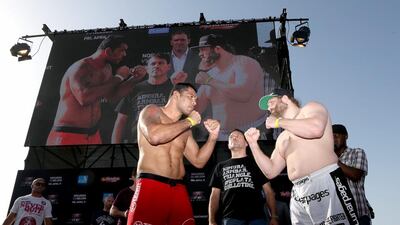“All I know is you have to watch,” Roy “Big Country” Nelson said at the weigh-in, “because we have five rounds of full action.”
Nelson was hyping his main event heavyweight bout with Antonio "Minotauro" Nogueira at the weigh-in yesterday, but he could easily have been speaking of the whole fight card.
Tonight marks the return of UFC to Abu Dhabi after four years, long overdue given the place martial and combat sports hold in the country. Nelson and Nogueira headline what promises to be a compelling nine-fight card at du Arena.
The co-main event, for example, between Clay "The Carpenter" Guida and Tatsuya "The Crusher" Kawajiri will be recognised by avid fight followers as a potential classic. Certainly that is the view of Garry Cook, the UFC executive vice president and managing director for EMEA (Europe, Middle East & Africa).
“Clay Guida, watch that fight,” Cook told The National. “That guy is so pumped, he cannot wait to get into the octagon. He’s fighting a very, very talented kid in Kawajiri and that one is the one for me. There’s going to be some fireworks in that.”
The card is part of a renewed UFC effort to establish the sport in fresher markets around the world, including this region where, organisers believe, the market is ripe for it.
Ticket sales for the event have been encouraging, though Cook is keen to point out UFC are approaching the event cautiously. Cook said he would be happy with a 5,000-6,000 attendance figure.
Yesterday, after the weigh-in, organisers pulled together the entire roster for a speech. Tonight, the fighters were told, could be the start of a completely new career for any of them.
"The issue in our sport, like all live sport, is that you never know what is going to happen," Cook said. "But five rounds of Nelson-Nogueira, those two guys are going to be hard at it. You wouldn't want to be at the end of either of those two."
osamiuddin@thenational.ae
Follow us on Twitter at @SprtNationalUAE

